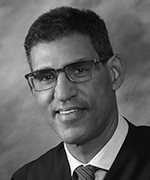Compared to the attention and interactions that come with high-stakes advocacy and high-profile bar leadership, appellate adjudication comes off as monastic to Streeter, who begins his day at 7 a.m. and remains at work for up to 12 hours.He is described as a man of great dignity, intellect and substance; soft-spoken, but "his brain is moving a mile a minute"; hard-working, and even-handed; a creative-thinker who ponders the equities of every case. He urges practitioners to be meticulous and judicious in briefing and oral argument. This means throwing out 8 of ten issues that could have been briefed; effective briefs convey information in a manner that is easy for the reader to digest; "organization, transitions and accuracy are key." At argument, he advises lawyers to answer questions directly and to be wiling to admit possible weaknesses to enhance one's reputation.
"I was always a very bookish sort of person. I was always happiest in the library or in the study space, problem solving," Streeter said. "I'm happy as a clam doing that."
 |
"When we ask questions, we are asking them
for a purpose. They may be questions that sound
hostile, but in fact are just probing or testing. It
may mask the reality that my judgment is the same as the advocate's judgment,
but I'm just testing to see if: Can what I perceive to be a weakness be
overcome in a credible way?"
|
Yesterday's Corporate Counsel featured 3 Advanced Appellate Tips Every In-House Litigation Counsel Should Know, by Ben Feuer:
1. Consider adding appellate rights to arbitration agreements.
2. Identify issues with important appellate implications at the outset of litigation.
3. Think carefully about seeking interlocutory or writ review of non-final orders because a weak effort could hurt your chances for the later appeal.
Congrats to 4/1's APJ: Justice Judith McConnell Honored for Work in Civic Education
A brief that actually uses Klingon phrases? Is that for real? Uh, yeah. We've got that right here.
Qala’!


